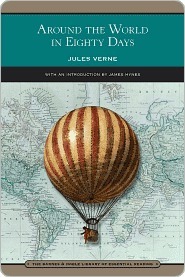The general saw nothing in this wager but the eccentricity of its surroundings, and the want of transire benefaciendo which ought to guide any reasonable man. If this extraordinary man went on in this manner all his life, he would finally quit the world, having done absolutely nothing for his own benefit or for that of others.
Literally "beneficial passage." Mentioned in "The Seamy Side of History" (L'envers de l'histoire contemporaine, 1848), part of La Comédie humaine, by Honoré de Balzac, and Around the World in Eighty Days by Jules Verne.


